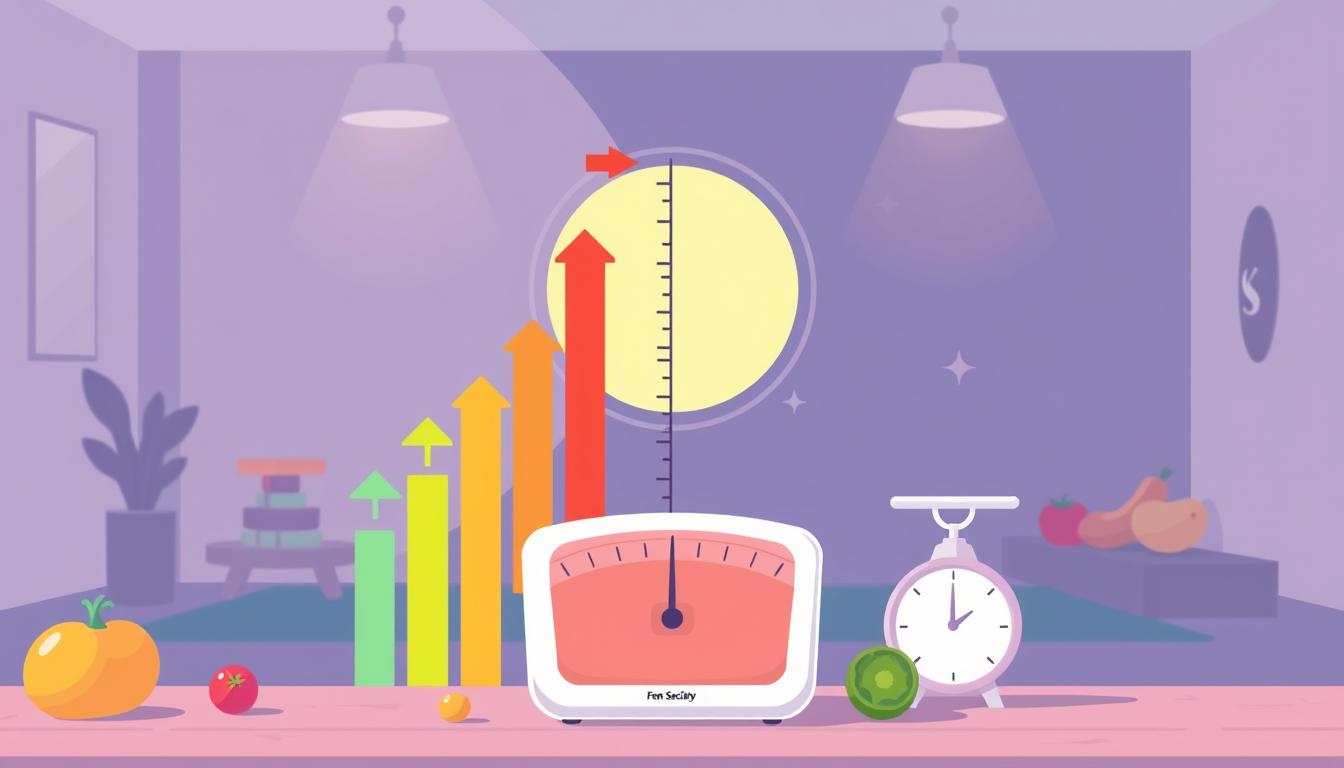Sadie Chartrand’s weight loss journey is truly amazing. In just five months, she lost an incredible 80 pounds. This shows that losing weight fast can be done.
Her success comes from determination, smart choices, and knowing how to manage weight. It’s a powerful lesson for anyone wanting to lose weight.
Key Takeaways
- Cutting carbs, eating more protein, and getting more sleep can promote sustainable weight loss.
- Focus on developing long-term healthy habits for lasting results, not quick fixes.
- Aim to lose 0.5-2 pounds per week for safe and effective weight loss.
- Combine cardio workouts with weight training for optimal health and body composition.
- Eat a balanced diet rich in protein, healthy fats, and nutrient-dense vegetables.
- Stay hydrated and get at least 7 hours of quality sleep each night.
My Weight Loss Journey Begins

My weight loss journey started with a shocking moment. I saw myself in a bathing suit. It was a wake-up call that made me want to change.
I knew I had to lose weight. It was affecting my health and how I felt.
Understanding My Starting Point
Exploring weight loss options showed me how hard it was. My BMI was too high, and moving was hard. I knew I had to change fast.
The Wake-Up Call That Changed Everything
Then, I learned I needed knee replacements. But doctors said I had to lose weight first. This made me take action.
I was ready to change my life, step by step.
Initial Health Assessment and Goals
I got help from doctors and nutritionists, but they didn’t help much. So, I did it myself. I watched my calories and lost 30 pounds.
My success made me more determined. I was on a path to a healthier life. I was ready for the next step.
The Science Behind Rapid Weight Loss

Understanding the science of losing weight fast can change the game. A calorie deficit is key for weight loss. Adding intermittent fasting and high-intensity workouts speeds up fat loss.
Intermittent fasting boosts blood pressure and heart health. It also fights type 2 diabetes. By eating less, you enter a calorie deficit state. This helps you lose weight quickly.
High-intensity workouts are great for fat burning. These workouts mix intense exercise with rest. They boost your metabolism and burn calories long after you stop exercising.
Exercise is important, but nutrition is more crucial for weight loss. Eating less sodium helps you lose weight and stay healthy. Avoiding processed foods also cuts down on carbs, helping you reach your weight loss goals.
Remember, losing weight is a long-term journey. A healthy diet, smart fasting, and intense workouts unlock rapid weight loss. Start your journey to a healthier, fitter you today.
Creating a Sustainable Diet Plan

Starting a weight loss journey needs a balanced diet. Focus on healthy eating habits, clean eating, and portion control methods. Let’s look at the important parts of a good diet plan.
Protein-Rich Food Choices
Protein is key for muscle, hunger control, and metabolism. Eat 5-7 ounces of protein-rich foods like lean beef, chicken, black beans, and lentils. Adding different protein-rich foods to your diet helps with healthy eating habits.
Healthy Fats and Their Role
Healthy fats are good for weight loss and health. Add olive oil, avocados, nuts, and seeds to your clean eating plan. These fats make you feel full and give important nutrients.
Essential Vegetables and Fiber Sources
Vegetables and fiber-rich foods are the base of your low-carb diet. Eat 2-5 cups of veggies daily, choosing different colors and textures. Include fruits, whole grains, and legumes for fiber. These fiber sources help with portion control methods and digestion.
Focus on protein, healthy fats, and fiber-rich veggies for a sustainable diet plan. Remember, being consistent and balanced is crucial for lasting success.
How I Easily Lost Over 80 Pounds in 5 Months

I lost over 80 pounds in 5 months. It was a remarkable journey. I followed a diet and exercise plan and got medical help.
I started at over 220 pounds. It was hard on my health and life. A doctor helped me lose weight fast. I got shots to help me eat less.
I also changed my life. I ate more protein and healthy foods. This made me feel full and lose weight slowly.
| Statistic | Value |
|---|---|
| Weight Loss in 5 Months | Over 80 pounds |
| Average Weight Loss per Month | Over 16 pounds |
| Recommended Weight Loss Rate | 1-2 pounds per week |
| Recommended Weekly Physical Activity | At least 150 minutes |
| Recommended Fruit and Vegetable Intake | 5 portions per day |
My success came from a mix of medicine, support, and lifestyle changes. I lost weight fast and improved my health in months.
“Consistency and dedication were the keys to my weight loss success. If I can do it, so can you!”
Implementing Intermittent Fasting

Intermittent fasting changed my life. I lost over 80 pounds in 5 months. I followed an 18/6 or 16/8 fasting plan. This meant fasting for 18 or 16 hours and eating for 6 or 8 hours.
While fasting, I drank lots of water. This helped control my hunger and improved my health. It also made me more focused and full of energy in the morning.
| Fasting Method | Fasting Window | Eating Window |
|---|---|---|
| 18/6 Fasting | 18 hours | 6 hours |
| 16/8 Fasting | 16 hours | 8 hours |
I also cut calories and focused on healthy foods. Eating protein-rich foods helped me lose fat without losing muscle. Regular exercise made my weight loss healthy and lasting.
“Staying under 50 calories allows one to remain in a fasted state, indicating a guideline that many practitioners follow.”
Intermittent fasting has been a big help for me. I suggest it to anyone wanting to lose weight or get healthier. Always talk to a doctor before starting.
The Power of Portion Control and Mindful Eating

Weight loss is more than just eating less. It’s about loving food in a healthy way. Knowing how much to eat and eating mindfully can help you control portions and stop emotional eating.
Understanding Serving Sizes
Knowing the right serving sizes is key to losing weight. Many eat too much without knowing it. Learn the sizes for common foods and use tools like cups and scales to stay on track.
Practicing Mindful Eating Techniques
- Eat slowly and enjoy each bite. This helps you feel full.
- Don’t eat while watching TV or on your phone. Focus on your food.
- Listen to your body’s hunger and fullness signals. Stop when you’re just right.
- Try different foods for fun. Colorful, whole foods are tasty and good for you.
Dealing with Emotional Eating
Emotional eating can block your weight loss. If you eat because you’re stressed or bored, stop and think. Find other ways to deal with feelings, like walking or talking to a friend.
Mastering portion control and mindful eating helps you lose weight and live healthier. It’s a lasting change for the better.
“The secret of change is to focus all of your energy, not on fighting the old, but on building the new.” – Socrates
Exercise Routine That Worked for Me

Starting your fitness journey needs a mix of things. I found that high-intensity interval training and strength training worked well together. This combo made my exercise routine very effective.
I began by walking more each day. I went from 1 mile to 4-5 miles. Walking helped me burn calories and get stronger. I also tried jogging, running, tennis, and Pilates to keep things interesting.
- Walking: 170 calories burned (for a 150-lb person, walking for 30 minutes at a very brisk pace)
- Jogging: 272 calories burned (for a 150-lb person, running at 12-minute mile for 30 minutes)
- Tennis: 204 calories burned (for a 150-lb person over 30 minutes)
- Pilates: 102 calories burned (for a 150-lb person, lifting for 30 minutes)
Adding strength training to my routine was a big change. It helped me build muscle and burn more calories. This supported my weight loss goals.
“Exercise plays an essential role in weight loss according to research findings.”
Combining cardio and strength training was key. It helped me lose weight and feel more energetic. This made my exercise routine something I could keep up with for a long time.
Importance of Hydration and Sleep

Drinking enough water and sleeping well are key for losing weight. Water helps keep you healthy and aids in weight loss. Good sleep also helps control hunger and supports your health goals.
Water Intake Guidelines
The body is mostly water, showing its importance. Drink at least 64 ounces of water a day. But, your needs can change based on your activity and health.
Switching to water can cut calories. Drinking water before meals can also help you eat less. Cold water can even make you burn more calories.
Sleep’s Impact on Weight Loss
Good sleep is vital for managing weight. Lack of sleep can make you want to eat more. Try to sleep at least 7 hours a night.
Drinking enough water and sleeping well help with weight loss. Focus on these habits for better health and weight loss results.
| Hydration Benefits | Sleep Benefits |
|---|---|
|
|
“Drinking water has been shown to temporarily boost metabolism by increasing the number of calories burned at rest.”
Tracking Progress and Adjusting Goals

Weight loss is a journey, not just a goal. To keep going, track your progress and change your goals when needed. Use before photos or measurements to keep your weight loss motivation and fitness motivation strong.
Make goals that fit your life and health. The National Heart, Lung, and Blood Institute (NHLBI) says start with losing 5-10% of your weight. Losing 1-2 pounds a week is best for lasting results.
| Goal | Timeframe | Projected Weight Loss |
|---|---|---|
| Initial Goal | 3 months | 12-24 pounds |
| Maintenance Goal | 6 months | 5-10% of starting weight |
Keep track of your progress with measurements, photos, and how your clothes fit. Use free online tools to figure out your daily calorie needs. This helps you know when to track progress and adjust goals. Celebrate your wins and don’t get down on setbacks. See them as chances to get better.
“Setting specific, measurable, action-based, realistic, and timely (SMART) weight loss goals can contribute to long-term weight control success.”
For lasting weight loss, be flexible and keep trying. Stay focused and open-minded. Be ready to adjust goals to keep moving forward and reach your goals.
Overcoming Weight Loss Plateaus

Many people hit a weight loss plateau on their fitness journey. It’s frustrating when the scale doesn’t move, even when you try hard. But, with the right strategies, you can break through and keep losing weight.
Common Obstacles
One big reason for plateaus is your body adapting to new calorie levels. As you lose weight, your metabolism slows down. Stress, lack of sleep, and small diet slips can also cause a plateau.
Breaking Through Barriers
To get past a weight loss plateau, try these strategies:
- Change your diet: Lower your calorie intake or try a new food mix to surprise your body.
- Do more exercise: Add HIIT or strength training to boost your metabolism and burn fat.
- Watch your food portions: Small changes in how much you eat can make a big difference.
- Get enough sleep and manage stress: Good sleep and stress control help with weight loss hormones.
- Get help from a pro: If you’re stuck, talk to a doctor or dietitian for advice.
Remember, plateaus are normal. With patience, the right changes, and support, you can keep moving forward.
| Statistic | Insight |
|---|---|
| A five to 10 percent decrease in body weight can lower metabolic rate by about 15 percent. | This shows why you need to adjust your diet and exercise as you lose weight to avoid a big slowdown. |
| Skipping just one workout can increase the likelihood of missing another one by 61 percent according to British research. | Staying consistent with your workouts is key to avoiding plateaus and achieving lasting success. |
| Approximately 0.8 to 1 gram of protein per kilogram of body weight is recommended to maintain muscle mass during weight loss. | Enough protein helps keep your muscle mass up and supports fat loss. |
By knowing the common obstacles and using effective strategies, you can beat weight loss plateaus. This will help you keep moving towards a healthier, fitter you.
Mental Health and Weight Loss Success

Weight loss is more than just a number. It’s about feeling good inside and out. As you start your weight loss journey, remember to take care of your mind too.
Emotional eating is a big challenge. If you eat when you’re not hungry, think about why. Try meditation, journaling, or talking to someone you trust to handle stress.
Success isn’t just about losing weight. Celebrate when you feel more energetic, move better, sleep better, or feel more confident. These wins are just as important.
Surround yourself with people who support you. Talk to friends, family, or online groups about your journey. Getting help from a therapist or nutritionist can also be very helpful.
Your weight loss journey shows your strength and dedication to health. By focusing on your mental health and staying positive, you’re on the path to lasting success and happiness.
| Name | Weight Lost | Timeline | Approach |
|---|---|---|---|
| Alyssa Greene | 25 pounds | 2.5 years | Self-education on nutrition |
| Tanisha Commodore | 80 pounds | 8 months | Keto diet after trying various tactics |
| Maggie Fierro | N/A | N/A | Kayla Itsines BBG after postpartum |
| Cookie Miller | 100 pounds | 18 months | Structured food and exercise plan, sharing progress on Instagram |
| Irvy | 132 pounds | N/A | Consistent gym visits and meal planning, emphasizing self-motivation |
The stories in this table show many ways to lose weight. They all show the power of a positive mindset and caring for your health.
“Losing weight is not just about the number on the scale, it’s about improving your overall health and well-being. Focus on developing a positive mindset and celebrate your non-scale victories along the way.”
Building Long-term Healthy Habits

Getting lasting weight loss is more than just dieting. You need habits that last for a long time. Here are tips to help you build those habits:
- Make small changes slowly. Don’t try hard diets. Just make little changes in eating and moving. It’s easier to keep up.
- Cook at home more. Eating out can mean big portions and unhealthy food. Cooking lets you control what you eat.
- Don’t buy junk food. Fill your kitchen with healthy, whole foods. They support your healthy life.
- Move more every day. Try taking the stairs or parking far. It’s easy to be more active.
- Get a buddy for support. Having someone to cheer you on helps a lot.
The secret to keeping weight off is not quick fixes. It’s about making habits that last. By making small, real changes, you can keep a healthy lifestyle for years.
“Consistency is the key to long-term weight loss success. Sustainable habits, not quick fixes, are what will truly transform your lifestyle and help you maintain your results.”
Maintaining Weight Loss Results

Reaching your weight loss goals is a big win. But, the real challenge is keeping those results over time. To keep your progress, keep up the healthy habits you started.
One important thing is portion control. It’s easy to eat too much after losing weight. Pay attention to how much you eat and eat healthy foods. Weigh yourself and take body measurements often to catch any weight gain early.
Staying active is key for sustainable weight maintenance. Change your workout as your body changes. Mix cardio, strength training, and flexibility exercises. This keeps your metabolism up and helps you stay fit.
Also, be ready for ups and downs. Losing weight isn’t always smooth. Have a plan to get back on track if you hit a bump. Keep trying and stay positive for long-term weight management success.
“The secret to permanent weight loss is to focus on the process, not the end goal. Healthy habits, not temporary fixes, are the key to lasting results.”
Keep focusing on weight maintenance to keep your achievements. Stay dedicated and consistent for a healthier, happier life. You’re on your way to sustainable weight loss for the long haul.
| Strategies for Maintaining Weight Loss | Key Benefits |
|---|---|
|
|
Conclusion
Seeing how easy it is to lose weight is amazing. The secret is making lasting lifestyle changes. Eating right, exercising, sleeping well, and drinking water are key.
Weight loss is a journey, not a quick fix. It takes time and effort. If you need help, get it. Don’t give up when things get tough.
Every small win is something to celebrate. Keep going and make those healthy lifestyle changes stick. With hard work and a positive attitude, you can reach your goals.
Getting fit and healthy is possible. Take on the challenge and see the amazing results. Your weight loss success story is just beginning!
FAQ
What are some effective strategies for sustainable weight loss?
To lose weight well, try cutting carbs and eating more protein. Also, lift weights and get more sleep. These habits help you keep the weight off for good.
How much weight can I realistically lose in a month or a few months?
Aim to lose 0.5-2 pounds each week. This is safe and keeps you healthy. Losing too fast is not good and hard to keep up.
How can intermittent fasting help with weight loss?
Intermittent fasting can make your blood pressure better and your heart healthier. It also protects against type 2 diabetes. Plus, it helps you eat fewer calories and lose weight.
What are some examples of protein-rich foods?
Foods high in protein include lean ground beef, skinless chicken breast, black beans, and lentils. Adults should eat 5-7 ounces of protein every day.
How can I overcome weight loss plateaus?
If you’re not losing weight, check your diet and exercise. Try more exercise, change your calorie intake, or try new workouts. If you need help, talk to a doctor or weight loss expert.
How can I develop healthy coping mechanisms for emotional eating?
To stop emotional eating, focus on being healthy, not just losing weight. Talk to friends, family, or experts if you struggle. They can help with motivation and mental health.
What are some tips for maintaining weight loss results long-term?
Keep doing what worked for weight loss. Watch your portion sizes and eat well. Stay active and adjust your routine as needed. Weigh yourself and measure your body regularly to catch any weight gain early.
